老年性痴呆和轻度认知障碍患者时间地点定向力受损情况探讨(2)
 |
| 第1页 |
参见附件(1008KB,2页)。
综上所述,从正常老人到AD的病情发展中可见:患者在MCI期仍保持时间地点定向力基 本完整;早期AD患者的时间定向力就明显受损,时间定向是认知下降的敏感指标;而到中重 度AD,地点定向力的下降表现突出起来。
参考文献
[1]Solomon PR, Hirschoff A, Kelly B, et al. A 7 minute neurocognitivescreening battery highly sensitive to Alzheimer's disease[J]. Arch Neurol, 199 8,55(3):349-55.
[2]Petesen RC, Dwdy R, Kurz A, et al. Current concepts in mild cognitive imp airment[J]. Arch Neuorl,2001,58(12):1985-1992.
[3]Petesen RC, Stevens JC, Ganguli M, et al. Practice parameter: Early detec tion of dementia: Mild cognitive impairment (an evidence_based review). Report o f the quality standards subcommittee of the American academy of neurology[J].Neurology,2001, 56(9):1131-1132.
[4]Guerrero_Berroa E, Luo X, Schmeidler J, et al. The MMSE orientation for ti me domain is a strong predictor of subsequent cognitive decline in the elderly[ J]. Int J Geriatr Psychiatry,2009,24(12):1429-1437.
[5]Tractenberg RE, Weiner MF, Aisen PS, et al. A simple method to rule out de mentia with temporal orientation[J]. Alzheimers Dement,2007,3(1):28-32.
您现在查看是摘要介绍页,详见PDF附件(1008KB,2页)。